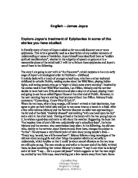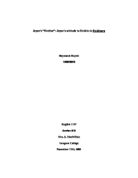While many characters in Dubliners desire something, face obstacles that frustrate them, and ultimately abandon their desires in paralysis, Farrington, in Counterparts sees everything in the world as an obstacle to his comfort and never relents in his vitriol. The tedious work at his office irritates Farrington first, but so does everything he encounters in the story. The root of Farrington’s violent and explosive behavior is the circular experience of routine and repetition that defines his life, again bringing up the theme of paralysis which is accentuated by is job, which is basically just copying and recopying various pieces of paper for a demanding boss. Farrington sees liberation from such monotonous activity in the warmth and drink of a pub, but his experiences there only continue the routine and only increase his anger. He repeats the story of the confrontation with his boss to his friends, who then also repeat it. Following the “round” tradition in which each person in a group takes turns buying drinks for all companions present, he continually spends money and consumes more alcohol. The presence of Weathers, who takes advantage of this system, and who beats Farrington in a wrestle makes Farrington realize how such tradition, humiliation and repetition literally rob him. His anger increases throughout the story which ends up in the brutal beating of his son. Therefore, Farrington’s epiphany consists in realizing what his situation in life is, which he thinks is monotonous, but unlike many characters in Dubliners, he doesn’t accept it and unleashes his anger which only he has created on his innocent son.
In Clay , Maria, unlike the female protagonists in earlier stories, does not confront important decisions and situations, but rather the few whose consequences seem small and trivial. Nothing much seems to happen in this story, and its monotony stands out even more since it follows the violent Counterparts in the collection, further recalling the theme of paralysis. Maria perfectly illustrates the quiet life of a single maid, whose spotless reputation as “a veritable peace-maker” attests to her placid lifestyle. However, the events in “Clay,” though quiet, are far from trivial. Even Maria, with her serene life, harbors unhappiness and frustration, and instead of being exempt from routine, she is in fact bogged down in it. Maria has such little conflict and so few varied experiences that the smallest details of daily living have become the focus of her energies, and these details deaden her life. For Maria, everything needs to be terribly organized. She intends for her attention to tiny details to create order and clarity in her life, but this actually encourages frustration and emotional reactions that are completely out of proportion to the current situation. When she realizes that she has misplaced the cake, she is so furious with herself and her negligence that she almost cries, unlike Eveline, who feels nothing after the loss of her lover and a potential new life. The title “Clay” draws attention to Maria’s fateful selection of clay in the Halloween game and applies that symbolism of early death to the story as a whole. Rather than implying a literal death, the clay casts Maria’s uneventful as a metaphorical early death. Clay also suggests the state of Maria and her life up to that moment. Like Farrington in Counterparts she fails to recognize the tedious routine of her days, as her repetition of the song suggests.
In A Painful Case, Mr Duffy, a predictable, cautious banker lives an existence of prudence and organization (like Maria in the previous story). He keeps a tidy house, eats at the same restaurants, and makes the same daily journey. This repeats the main theme of paralysis. Occasionally, Mr. Duffy allows himself an evening out at the opera or a concert, and on one of these evenings he engages in a conversation with another audience member, Mrs. Sinico, a woman who sits beside him. Further encounters follow at other concerts, and on the third occasion Mr. Duffy sets up a time and day to meet with her. Their discussions revolve around their similar intellectual interests and with each meeting they draw more closely together. Such sharing gradually softens Mr. Duffy’s hard character. However, during one of their meetings, Mrs. Sinico takes Mr. Duffy’s hand and places it on her cheek, which deeply bothers Mr. Duffy. In response, he cuts off the relationship. Four years pass. One evening, during his usual dinner in town, Mr. Duffy reads a newspaper article that surprises him enough to halt his eating and hurry home. There, he reads the article, entitled “A Painful Case”. The article recounts the death of Mrs. Sinico, who was hit by a train at a station in Dublin the previous evening. The news of Mrs. Sinico’s death at first angers but later saddens Mr. Duffy. Perhaps suspecting suicide or weakness in character, he feels disgusted by her death and by his connection to her life. Disturbed, he leaves his home to visit a local pub, where he drinks and remembers his relationship with her. His anger begins to subside, and by the time he leaves to walk home, he feels deep remorse, mainly for ending the relationship and losing the companionship it offered. Upon seeing a pair of lovers in the park by his home, Mr. Duffy realizes that he gave up the only love he’d experienced in life. He feels utterly alone.







